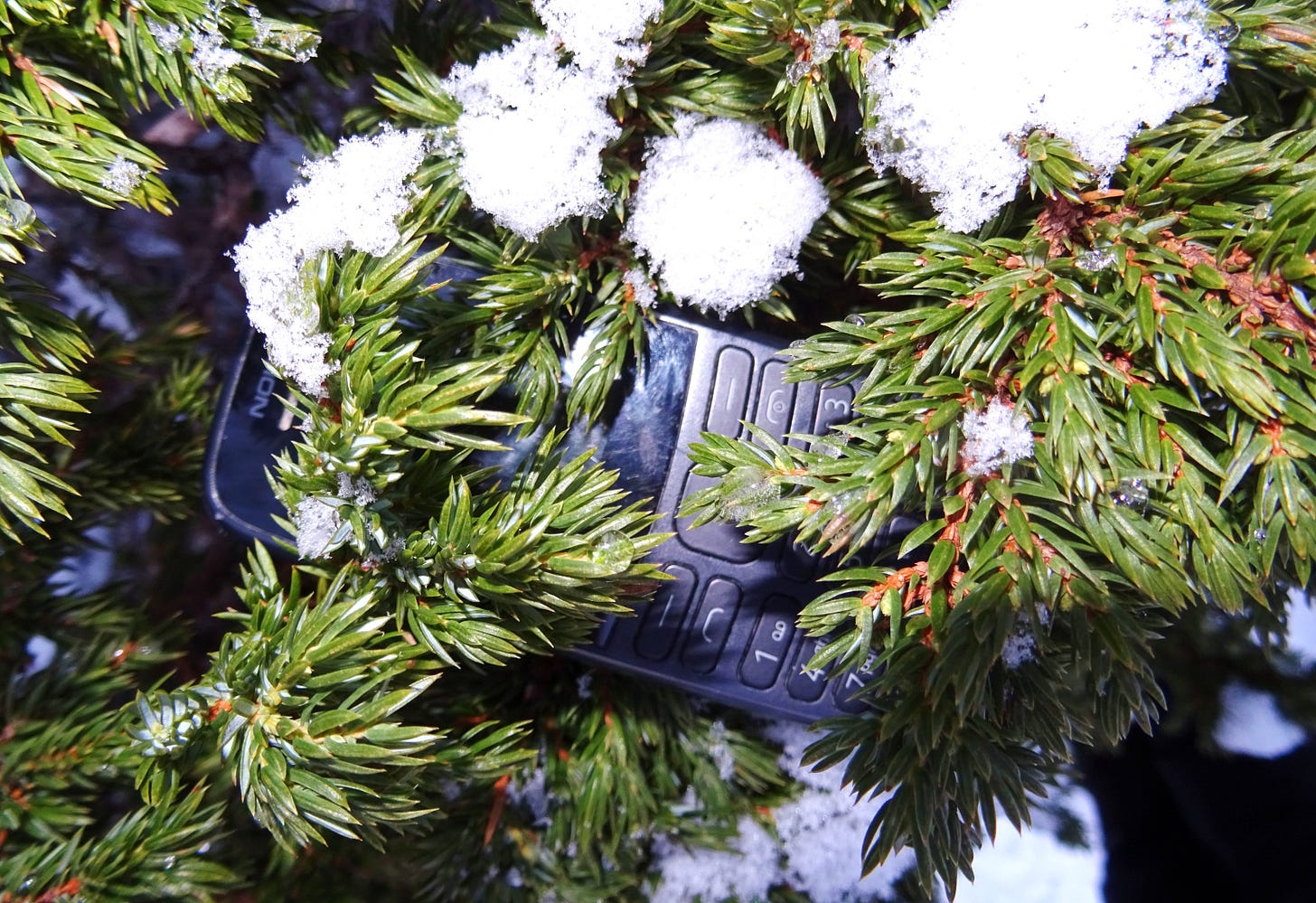Hi readers! On the second Tuesday of each month, I write about a surprise theme in the general field of nature, minimalism, simple living, and sustainability. Today, I’ll tell you why I still live without a smartphone!
These are personal reflections, related to discussions about the “attention economy” and our disconnect from the real world. I am not trying to convince you to throw away your phone!
I do own a phone – it’s just not smart. People tell me it's the kind of phone drug dealers use to avoid being tracked. I use it as an alarm clock, for occasional calls or texts (that take ages to type), and to play Tetris when I’m very bored. And of course I can be contacted in case of an emergency. I rarely spend more than an hour per week on my phone.
For years, not having a smartphone wasn’t something I thought about much. I just didn’t want one, and my laptop was sufficient for anything I needed to do. However, over the past few years, things have changed. In some places, I cannot (legally) take a bus without a smartphone. My workplace requires a smartphone for two-factor authentication. My friends and colleagues communicate mostly on apps I don’t have access to. In more and more situations, smartphone ownership is automatically assumed, and I have been wondering: Why is it that I still don’t own one?
1. I want to maintain a sense of adventure
Of course, getting around in unfamiliar places can be more of a hassle without a smartphone. When I need to (or want to) go somewhere specific, e.g. for a doctor’s appointment, I plan ahead – I write down bus times and draw a small map on a piece of paper. For hikes, I take an actual paper map. However, when I go for a casual walk or explore a place I visit, I often just go! I only recently realized how unusual it has become to move around without access to your location on a map, especially in a city. But I find it’s often much more enjoyable not to know where you are and what’s around. You explore with fewer expectations, everything you find is a surprise, and you get to know areas you would otherwise have never seen. Even near my home I occasionally still find new trails. Do I sometimes get lost? Yes. But that’s part of the fun.
2. I want to spend time in the real world
Recently I wrote about “How to do nothing” by Jenny Odell – a book that criticizes the attention economy. She argues that we are flooded with shallow information that is presented out of context and distracts us from the actual world in front of us. This resonated with me – I want to live in the real world at least for part of my day.
The thing is: I spend a lot (= too much) time in the digital world anyway, using my laptop. I mostly work an office job, my volunteer position involves computer work, I spend time on Substack and YouTube, and I talk to friends and family online. I feel like all that is enough – I don’t want to look at a screen even more. I don’t want to be tempted to read or listen to something on my phone while standing in line at the supermarket, walking to work, or waiting for a bus. That time is needed for sorting my thoughts and looking around. Especially since getting more into species identification, I have noticed so many colourful insects and plants while just waiting for a bus or train – one day I even discovered a completely unexpected lizard haven! And when I am with other people, I want to focus only on them.
3. I don’t want to be connected with people all the time
I like people. And I understand the appeal of apps that allow you to stay in touch easily. But I believe it’s not always a good thing if communication is easy. Many people seem to have a much lower barrier when it comes to writing in a chat app (compared to e.g. email). I already get too many messages to reply to each day – and I am sure with a smartphone I would get a lot more. I am very introverted, and being in touch with numerous people throughout large parts of the day feels overwhelming – and short, disconnected texts make that worse. My brain functions better with fewer, longer, more in-depth messages. I also think that quick, disconnected messages can generate an illusion of being in touch, while there is no real closeness.
4. I don’t want to be able to see any non-urgent messages or browse the internet while on a hike
This reason is a combination of the previous ones, but it is also the most important reason: It’s the one my gut tells me immediately when I ask myself again whether it’s time to get a smartphone.
Whenever I’m home and my laptop is on, it feels a bit like the people sending me messages are in my room. And in a sense, that’s true – I engage with their requests and thoughts as if they were physically there. If I had a smartphone, that access to me would extend everywhere I go. It would mean that I’d not truly be alone anymore when going on a hike, bike ride, or boat trip by myself. But being alone is necessary for me to really engage with the natural world and restore my energy, and I feel very protective of my alone time in nature. And while I am most concerned about emails and other messages, I also don’t like the idea of having the entire internet available. There would always be knowledge I should obtain, news I should know about, right in my pocket.1
If you’ve read this far, maybe you think: “Doesn’t Hannah know that you can just turn off your phone?” I do know. But, first, I also know myself – once I have access to the internet, there will be a part of me that will want to read my messages, find out about the latest news, and use all the functions that make life easier! It would take energy to constantly suppress that part. Second (this might well sound strange…), for me, my laptop has some kind of demanding presence even when it’s switched off. I am sure a smartphone would feel similar.
So, overall, not having a smartphone still makes sense for me. This also indirectly benefits other people: I have more space to pay attention to how my friends are and to engage in good causes. However, there are now also occasions when I generate extra work for others – for example, when I cannot receive group messages and need a separate invitation to events, or when a special technical solution needs to be found for me. I am not comfortable with these situations – and because they are becoming more frequent, I am sure I will get a smartphone eventually.
But for now, I’d really like to hear your thoughts! I am very curious about how people maintain their mental health while constantly being connected, especially if they’re introverted. Are you able to mentally disconnect even if your phone is on? Or have you developed strategies for regularly switching off notifications (or the phone) that work well for you? Or do you, like me, just not own a smartphone??
Enjoy the rest of the week!
Hannah
There are of course other disadvantages and advantages I don’t discuss here to keep the text short – for example, the fact that owning a smartphone usually means sharing a lot of your data, or that it would allow me to replace multiple devices by a single one.






Another great subject, Hannah. Oh, the number of times I say to my husband "I'm sick of this phone, I'm getting a nokia". However, for various reasons, having a basic smartphone makes sense for me at this moment in time and I've kind of found a happy way forward. I find pinging notifications distressing! I'm not active on social media, so don't have those to deal with anyway. With substack, I don't have the app, meaning I pretty much only use it on my laptop. My phone is on silent the majority of the time, and I don't always have it with me, so I can respond to things when I'm in a frame of mind to check. I only hold on to apps that actually serve a purpose, that way less clutter and fewer notifications. I must say though, I've really got used to having a camera. And this one sounds really daft, but because my phone is a cheapy effort (I refuse to spend a fortune on a bloody phone!), it's huge - I can barely hold it - so I got a case that means I can hold it like a book. Makes the whole thing much less annoying. I'm not sure it's such a bad thing that workplaces and other organisations have to provide work arounds for people without smartphones - it's really sad to read how uncomfortable that makes people feel. Strange times. Thanks for this conversation starter, really enjoy your blog.
I have a smartphone and frequently put it on airplane mode to switch off from it at evenings and weekends. I’ll also deliberately hide it away in a drawer at home to get away from its presence, and leave it behind at home if I’m going somewhere and know I won’t need it, like to the shops or for a local walk.
When I went on a solo hiking week, I had my phone on airplane mode almost constantly, just using it once a day to whatsapp my partner confirming I’d got to my accommodation safely. I like the convenience and feeling of safety of knowing it’s there if I need it and being able to quickly check maps/public transport updates/banking apps as needed. But I was the last of my friends to get a smartphone and if they weren’t ubiquitous now, I wouldn’t have one. (I would happily swap the stress of WhatsApp messages for old-fashioned letter writing!)